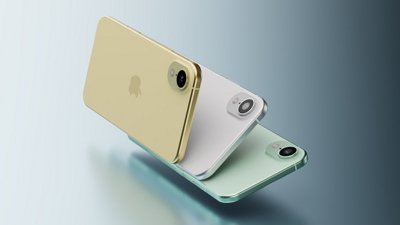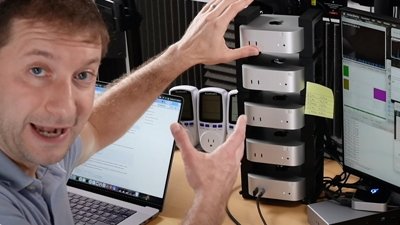The Federal Aviation Administration's efforts to move forward with allowing passengers to use electronic devices during takeoff are reportedly being slowed by technicalities and the desire to develop a single, concise, future-proof set of regulationss.
Speaking with The New York Times' Bits Blog, a pair of sources close to the FAA said that the agency is under considerable pressure to relax the rules that require passengers to power down their devices prior to takeoffs and landings. The industry working group created by the administration to address the issue will likely give its final report this summer, and the FAA hopes to announce such a rule change in by the end of the year.
Holding up the process is the reality of the many types of electronic devices passengers bring onto airplanes now. In addition to tablets such as Apple's iPad — which can also pack cellular connectivity — passengers bring cellular phones, Wi-Fi-enabled ereaders like Amazon's Kindle, portable gaming devices with Wi-Fi or cellular connectivity, and more.
The FAA's working group, then, must account for these sorts of devices and determine what mode they should be put into when on an airplane. Many electronic devices currently feature an "airplane mode," in which they do not send or receive wireless signals, but that term can mean different things across different devices, so the group must develop a standard.
The group is also concerned with making sure that flight attendants "do not have to be the social police for which devices are acceptable during flight." Also a concern is making sure that the recommended rules apply to devices that aren't on the market today.
Unsatisfied with the FAA's progress on the issue, Missouri's Senator Clair McCaskill recently announced that she planned to introduce legislation circumventing the agency and allowing passengers to use their electronics from takeoff through to landing. McCaskill's bill is still in the formative stages, and will likely only serve as pressure on the FAA.
"So it's OK to have iPads in the cockpit; it's OK for flight attendants," McCaskill has complained. "Yet it's not OK for the traveling public. A flying copy of 'War and Peace' is more dangerous than a Kindle."
 Kevin Bostic
Kevin Bostic














 Malcolm Owen
Malcolm Owen
 Christine McKee
Christine McKee
 Amber Neely
Amber Neely
 Andrew O'Hara
Andrew O'Hara


 Mike Wuerthele and Malcolm Owen
Mike Wuerthele and Malcolm Owen
 William Gallagher
William Gallagher








47 Comments
And here I thought aluminum was supposed to be good at shielding radio waves. Couldn't possibly make the conduits out of aluminum or anything…
[quote name="AppleInsider" url="/t/156646/technicalities-holding-up-faa-decision-on-electronics-on-airplanes#post_2300035"]The group is also concerned with making sure that flight attendants "do not have to be the social police for which devices are acceptable during flight." Also a concern is making sure that the recommended rules apply to devices that aren't on the market today. Unsatisfied with the FAA's progress on the issue, Missouri's Senator Clair McCaskill recently announced that she planned to introduce legislation circumventing the agency and allowing passengers to use their electronics from takeoff through to landing. McCaskill's bill is still in the formative stages, and will likely only serve as pressure on the FAA. "So it's OK to have iPads in the cockpit; it's OK for flight attendants," McCaskill has complained. "Yet it's not OK for the traveling public. A flying copy of 'War and Peace' is more dangerous than a Kindle."[/quote] Why is it that when people get elected to office, they apparently are required to surgically remove half of their brain? Let the FAA do its job. They're the ones responsible for airline safety - not some idiot Congresswoman from MO. Oh, and btw, to answer your question--there are more issues than just radio signals involved. I suspect that the biggest one is that the airline is required to be able to evacuate a plane quickly in the event of an emergency. That's why they're so strict about things under your feet needing to be all the way under the seat in front of you. Passengers playing with electronic devices during an emergency could endanger themselves or other passengers. A pilot is well trained in how to handle emergencies and doesn't constitute the same issue.
Let the FAA do its job. They're the ones responsible for airline safety - not some idiot Congresswoman from MO.
Oh, and btw, to answer your question--there are more issues than just radio signals involved. I suspect that the biggest one is that the airline is required to be able to evacuate a plane quickly in the event of an emergency. That's why they're so strict about things under your feet needing to be all the way under the seat in front of you. Passengers playing with electronic devices during an emergency could endanger themselves or other passengers. A pilot is well trained in how to handle emergencies and doesn't constitute the same issue.
Agree that this Congresswoman shouldn't interfere. Disagree about politicians being half-brain-dead. If your decisions/actions or mine are publicized as much as those of politicians, can they stand up better to scrutiny? You might say yes, but I have no doubt the answer is no in my case. We don't want to admit this, but politicians are more intelligent than the average citizen. I say this, even though I can't stand most of them.
As for emergency evacuation being the issue, I have trouble seeing that. If that were the case, we wouldn't be allowed to eat or do anything else. Furthermore, we are allowed to use electronics after takeoff and the plane is in the air. Emergencies don't just happen while a plane is on the ground.
Why is it that when people get elected to office, they apparently are required to surgically remove half of their brain?
Well, they don't exactly want their plan for stealing the Infinite Improbability Drive to be noticed, now do they?
Just don't allow cell phones. Please. Unless you want to see rampant 'cabin rage' from the idiot braying into his phone next to people who just want to survive the flight.